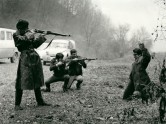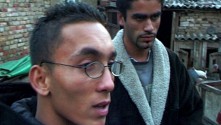
Early Works
(Rani radovi)
Screening on Film
$12 Special Event Tickets
With Milja Vujanovic, Bogdan Tirnanic, Cedomir Radovic.
1969, 35mm, color, 75 min.
Serbo-Croatian with English subtitles.
Print source: Yugoslav Kinoteka
My film speaks about the impossibility of changing the world with romantic means and a feeling of alienation.
One of Zilnik’s most commercially successful films and winner of the Golden Bear in Berlin in 1969, Early Works was filmed in the autumn of 1968 while the drama of state socialism in Yugoslavia unfolded. This was, as Zilnik states, “a time of intense discussion in half the countries on the face of the earth about whether it was possible to establish socialism, according to Marx’s principles, before industrialization with a small proletariat.” This semi-autobiographical work focuses on three revolutionaries determined to spread communist revolution throughout Serbian villages. They explore various socio political realities: working in a factory, educating farmers, being sexually promiscuous, disseminating political propaganda, engaging in war. Investigating leftist movements of the 1960s while incorporating the roots of Marxism—the screenplay is based on quotations from Marx’s work of the same name—Early Works ultimately captures a certain state of helplessness on the part of revolutionaries to change society and themselves. "The film tries to demystify the religious myths of socialism," says Zilnik. The disjointed structure of the film and collage of filmmaking techniques consummates Zilnik’s powerful, anarchic vision at this explosive time.
One of the most important and radical films of the late 1960’s, Black Film reveals Zilnik's personal commitment to social change, expressed through his act of bringing home—to his wife’s dismay—half a dozen homeless men late one night. While they enjoy themselves, the filmmaker tries to “solve the problem of the homeless” carrying along a film camera as a witness. Zilnik includes at the end of the film a “proclamation” that “the film is about the position of filmmakers and intellectuals, who although they pretend that they are changing the society and helping people, are actually not doing anything but making films.”

















